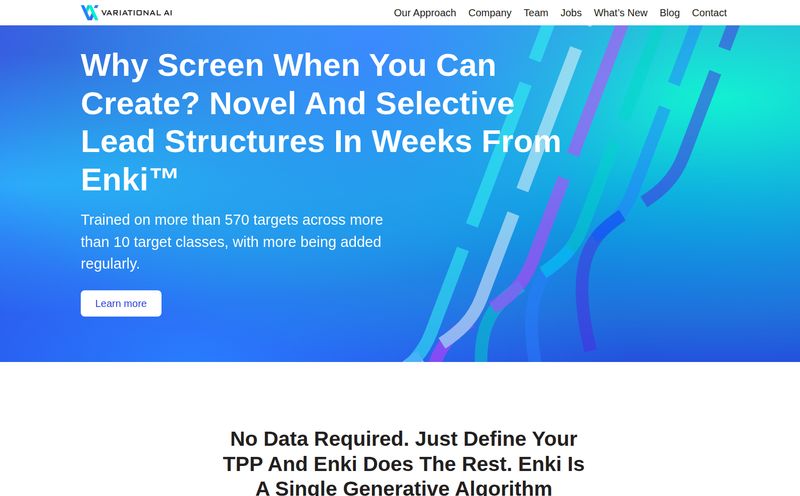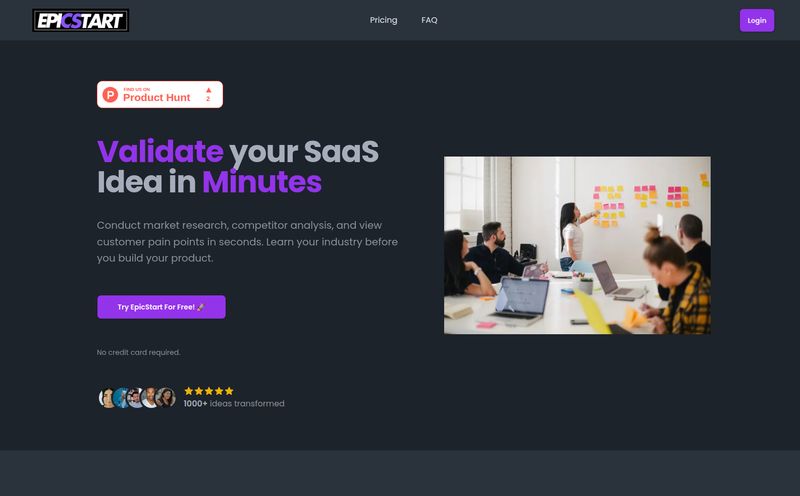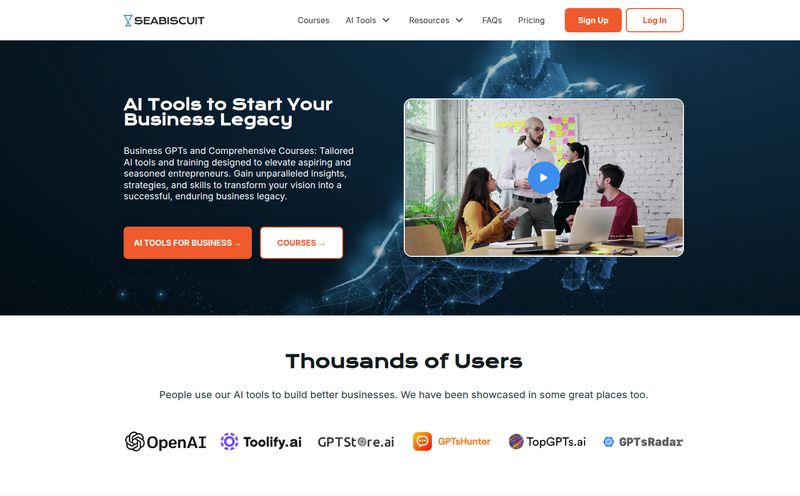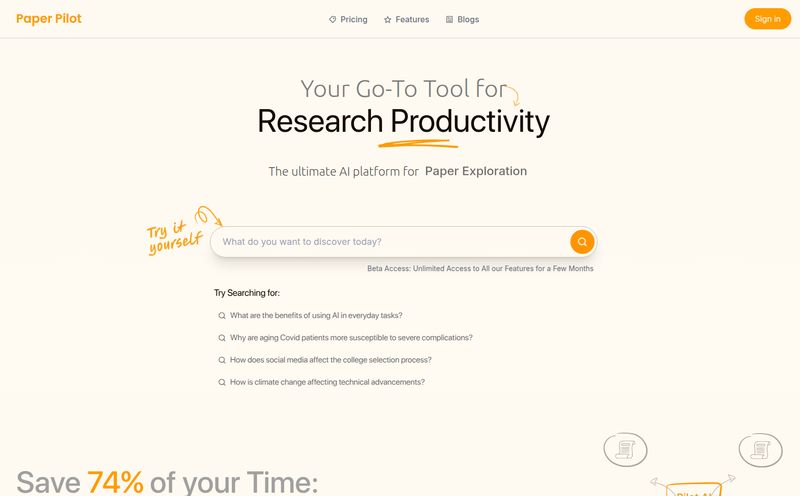If you're in consulting, private equity, or any professional service, you know the grind. It's the endless hours spent wrestling with data, hunting for that one perfect stat buried in a 50-page report, and basically reinventing the wheel for every new proposal deck. We’ve all been there, staring at a blank slide at 11 PM, fueled by coffee and desperation, thinking, “Didn’t we do a similar analysis for the Acme Corp project last year?”
The industry is buzzing with AI tools promising to be our savior. Most are just fancy wrappers for public-facing LLMs, which is fine, but they don't know your business. They don't have access to your firm's collective genius, locked away in shared drives, past reports, and CRM notes. That's where things get interesting, and where a tool like Kenley caught my eye. It’s not just another chatbot; it’s being pitched as an AI-powered research platform that acts like a spreadsheet. A spreadsheet that taps directly into your firm’s brain. Color me intrigued.
What Exactly is Kenley? (And Why Should You Care?)
So what’s the big deal? At its core, Kenley is an AI research tool built specifically for the high-stakes world of consulting and professional services. Forget generic answers. The whole point of Kenley is to merge the power of modern AI with your company's most valuable, and often underutilized, asset: its own historical data and knowledge. It aims to create what they call an “organizational knowledge graph.”
Think of it like this. Your firm has years of projects, reports, client data, and market analysis. It's a goldmine! But it's probably scattered across SharePoint, Google Drive, a creaky old CRM, and maybe even a few senior partners' hard drives. A total mess. Kenley's job is to connect to all those sources, understand them, and create a single, intelligent brain. Then, it gives you and your team an interface—one that looks and feels like a spreadsheet—to ask it questions. Not just “what is the market size for widgets?” but “what were our key findings on widget market penetration from the Q3 project last year, and can you cross-reference that with current industry growth trends?” See the difference? It’s huge.
The Core Features: Breaking Down Kenley's Toolkit
It’s not just one thing, it's a combination of tools designed to work together. This is where it moves beyond a simple search bar into something more powerful.
A Search Bar That Actually Understands Your Firm
I’ve always felt that the search function in most enterprise software is a joke. You know you wrote a document with the phrase “logistics optimization,” but the system can't find it unless you type the exact, perfect keyword. It’s infuriating. Kenley’s promise of “enterprise search” is about contextual understanding. It’s designed to know the difference between a proposal, a final report, and an internal memo, and to pull the most relevant information, not just the most recent. Honestly, this feature alone could be a godsend for anyone who’s ever lost an afternoon to SharePoint spelunking.
Your Own Team of AI Research Agents
This is where it gets a little sci-fi. Kenley includes AI research agents that you can deploy to do the grunt work. Need to perform due diligence on a target company? You can set an agent to scour the web, your internal files, and premium data sources to compile a preliminary report. It’s like having a team of tireless junior analysts who never need to sleep or take a coffee break. The goal isn’t to replace the human consultant, but to arm them. To let them focus on high-level strategy and client interaction, not mind-numbing data collection.

Visit Kenley
Automating the Un-Automatable
Every firm has those workflows that are critical but painfully manual. Drafting proposals is a classic example. You pull a slide from this old deck, a chart from that one, update some stats, and rewrite the boilerplate. Kenley’s automation tools aim to streamline this. By understanding the components of your past successful proposals, it can help generate a solid first draft in a fraction of the time. This is a massive lever for efficiency and lets your best people spend more time on billable work rather than administrative overhead.
The Real-World Impact: How Kenley Changes the Game
Okay, features are nice, but what does this actually mean for a firm? The biggest win here is the preservation and activation of institutional knowledge. People come and go, but their work and insights shouldn't walk out the door with them. By creating that knowledge graph, Kenley essentially builds a living archive of your firm's expertise. The new associate can benefit from the wisdom of a partner who retired five years ago. That’s powerful stuff.
The efficiency gains are obvious, too. Faster proposal generation, quicker due diligence, and less time spent on research directly translates to either higher margins or the ability to take on more projects without burning out your team. In a competitive market, that speed can be the difference between winning and losing a bid.
The Elephant in the Room: Security and Integration
Now, let's get down to brass tacks. No tool is perfect, especially in the enterprise space where security and systems are a tangled web. There are a couple of things to be aware of with Kenley.
Connecting the Dots: The Integration Question
This isn't a plug-and-play app you download from an app store. To get that amazing organizational knowledge graph, you have to, well, connect it to your organization. Kenley requires integration with your existing data sources. They offer out-of-the-box connectors for common systems, which is great, but complex or legacy setups might require some custom work. This isn't really a 'con' so much as a reality of any serious enterprise tool. You have to do the setup work to reap the rewards. Don’t expect to just flip a switch and have it work magically in five minutes.
A Word on Security and Certifications
When you're feeding an AI your company's crown jewels, security is everything. Kenley states they offer enterprise-grade security, which is the baseline expectation. However, it's important to note that as of my last check, their SOC II and ISO 27001 certifications are still in progress. For those unfamiliar, these are critical, third-party audited standards for data security and management. The fact they are in the process is a good sign—it shows they’re taking it seriously—but for firms with extremely strict compliance requirements, you'll want to have a direct conversation with their team about their roadmap and current security posture. It's a bit of a yellow flag, but not a red one for me, more of a ‘do your homework’ situation.
So, What’s the Price Tag on This AI Powerhouse?
And now for the question on everyone's mind: how much does it cost? Unsurprisingly, you won't find a pricing page with neat little tiers. Kenley's pricing isn't public, which is standard practice for enterprise-level SaaS. The cost will almost certainly depend on the number of users, the complexity of the integrations required, and the specific modules you need.
My advice? Don't let the lack of a public price scare you off if the tool seems like a fit. The real question is about ROI. If it can save each consultant a few hours a week and help you win just one extra project a year, it could pay for itself many times over. You’ll have to contact their sales team for a demo and a custom quote based on your firm’s specific needs.
Is Kenley the Right Fit for Your Firm?
After looking it over, who is this really for? It’s a perfect match for mid-to-large-sized consulting firms, market research agencies, private equity funds, and corporate strategy teams. Basically, any organization where institutional knowledge is a competitive advantage and research is a core, time-consuming activity. If your team is constantly bogged down by manual data-gathering and you feel like you're losing valuable knowledge every time someone leaves, Kenley could be a game-changer.
Who is it not for? Probably not for solo consultants or very small teams who might not have the critical mass of historical data to make the knowledge graph truly powerful. It might also be overkill for businesses whose work doesn’t involve heavy research or complex proposal generation. Some might argue that you can piece together similar functionality with other tools, but in my experience, the seamless integration of internal and external data is where specialized platforms like this really shine.
Frequently Asked Questions about Kenley
What makes Kenley different from a generic AI like ChatGPT?
The key difference is the data source. While models like ChatGPT are trained on the public internet, Kenley is designed to integrate deeply with your firm's private, internal data. This allows it to answer questions and automate tasks with the specific context of your past work, clients, and expertise, which a public AI knows nothing about.
Is Kenley difficult to set up?
It's not a simple one-click install. Because its power comes from connecting to your existing systems (like SharePoint, CRM, etc.), it requires a dedicated integration and setup process. They provide connectors to simplify this, but you should budget time and technical resources for the initial implementation.
Can Kenley access real-time information from the web?
Yes. It's built as an AI-powered web research tool. A core part of its functionality is its ability to use AI agents to find and synthesize information from the live web, and then combine that with the insights from your internal knowledge base.
Is my firm's data safe with Kenley?
Kenley promotes its enterprise-grade security. They are also actively working toward official SOC II and ISO 27001 certifications, which are industry-standard security audits. While these are in progress, it's a positive indicator they take security seriously. Firms should still conduct their own due diligence on Kenley's security protocols.
What kind of firms benefit most from Kenley?
Consulting firms, private equity funds, market research companies, and corporate M&A or strategy departments are prime candidates. Any professional service firm that relies heavily on research, due diligence, and proposal generation, and has a significant body of existing work to draw from, would see the most benefit.
My Final Take
Kenley is an ambitious and, frankly, exciting tool. It’s tackling a problem that has plagued professional services firms for decades: how to effectively capture and reuse institutional knowledge. It's not a magic bullet, and the need for integration and the pending security certifications are points to consider. But the concept of a smart, context-aware AI that learns from your own wins and losses is incredibly compelling. If your firm is ready to move beyond basic AI chatbots and invest in a system that can become a true extension of your team's collective brain, Kenley is absolutely worth a serious look.
Reference and Sources
- Kenley Official Website (URL assumed as not provided)
- McKinsey & Company: The economic potential of generative AI - For further reading on AI's impact on productivity in knowledge work.



